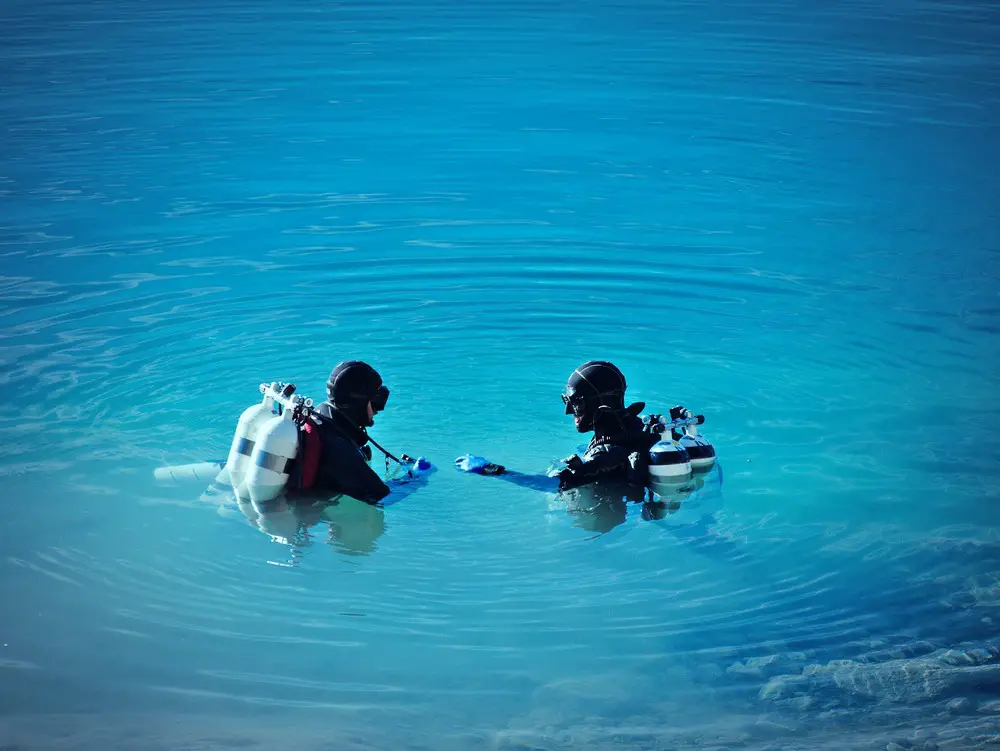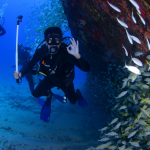
The hardest things about scuba diving include buoyancy control, equalisation of the ears on descent, equipment management and psychological factors, as diving can be an intense experience for some and some beginners panic. Scuba diving can also be physical and require a certain level of stamina too.
Scuba diving is a rewarding and thrilling activity, but it also comes with certain challenges. Here are some of the aspects that can be considered the hardest things about scuba diving:
- Buoyancy control: Achieving and maintaining proper buoyancy control is one of the most challenging skills for divers to master. Maintaining neutral buoyancy allows divers to conserve energy, avoid damaging the environment, and enhance safety. It takes practice and experience to control buoyancy effectively.
- Equalisation: Equalising the pressure in your ears and sinuses as you descend is crucial to prevent discomfort or injury. Many divers struggle with equalisation techniques, especially if they have congestion or other issues with their ears.
- Equipment management: Scuba diving involves using complex equipment, including the regulator, BCD (buoyancy control device), tanks, and other gear. Managing and maintaining the equipment properly is essential for a safe and enjoyable dive. Learning how to set up, use, and troubleshoot equipment can be challenging, especially for beginners.
- Psychological factors: Scuba diving can be an intense experience, and managing psychological factors can be difficult for some people. Dealing with anxiety, claustrophobia, or fear of the unknown underwater environment can pose challenges. Building confidence and staying calm underwater are skills that divers develop over time.
- Physical fitness and stamina: Scuba diving requires a certain level of physical fitness and stamina. Carrying heavy equipment, swimming against currents, and dealing with the increased resistance underwater can be physically demanding. Maintaining a good level of fitness is important to handle the physical aspects of diving.
- Environmental conditions: Diving in challenging environmental conditions, such as strong currents, low visibility, or cold water, can add to the difficulty level of a dive. These conditions may require additional skills and experience to navigate safely.
It’s worth noting that while scuba diving can present challenges, proper training, experience, and preparation can help overcome these difficulties. Divers who invest time in learning and honing their skills can enjoy the wonders of the underwater world while minimizing risks and enhancing their overall diving experience.
Why is scuba diving difficult?
Scuba diving can be considered difficult for several reasons:
- Underwater environment: The underwater environment is vastly different from the terrestrial world humans are accustomed to. It introduces new challenges such as buoyancy control, pressure changes, reduced visibility, and limited mobility. Adapting to these conditions and learning how to navigate and interact safely in the underwater world requires knowledge, skills, and experience.
- Equipment and technical aspects: Scuba diving involves using specialised equipment, including regulators, tanks, buoyancy control devices (BCDs), dive computers, and more. Understanding how to assemble, operate, and maintain this equipment properly is crucial for a safe dive. Learning about the technical aspects of diving, such as gas management, decompression limits, and emergency procedures, requires training and practice.
- Skills and techniques: Scuba diving requires the mastery of specific skills and techniques to ensure safety and enjoyment. These include buoyancy control, equalization, underwater communication, navigation, and emergency procedures. Learning and refining these skills can take time and practice.
- Physiological considerations: The underwater environment introduces physiological considerations that are unique to diving. The increase in pressure as you descend affects the body, especially the ears, sinuses, and lungs. Equalising the pressure in these areas is essential to prevent discomfort or injury. Additionally, nitrogen absorption and elimination can cause decompression sickness if not managed properly. Understanding these physiological factors and following proper diving procedures is crucial for safety.
- Psychological factors: Scuba diving can evoke various psychological factors, such as anxiety, claustrophobia, or the fear of the unknown. Being in an underwater environment with limited visibility and the potential for encountering unfamiliar marine life can be intimidating for some people. Managing these psychological factors and building confidence underwater is an important aspect of scuba diving.
While scuba diving presents challenges, it is important to note that with proper training, experience, and adherence to safety protocols, these difficulties can be overcome. Divers who invest time in education, practice, and gaining experience can enjoy the incredible rewards and beauty of the underwater world while minimising risks.
How hard is it to breathe while scuba diving?
Breathing while scuba diving is generally not difficult when using proper scuba diving equipment. The equipment, including the regulator, is designed to deliver air to the diver in a way that mimics natural breathing. When you inhale from the regulator, it provides a steady flow of air at the same pressure as the surrounding water, allowing you to breathe comfortably.
However, there are a few factors that divers should be aware of:
- Breathing resistance: The regulator may have some resistance when you inhale, which can feel different from breathing on land. It’s important to adjust your breathing technique to take slightly longer, slower breaths while diving. This helps ensure efficient air exchange and reduces the potential for hyperventilation.
- Breathing rate: Your breathing rate can increase while scuba diving due to physical exertion, excitement, or anxiety. It’s essential to monitor your breathing and avoid rapid, shallow breaths, which can lead to increased gas consumption and potentially shorten your dive time. Proper training and experience can help you regulate your breathing and maintain a relaxed and controlled breathing pattern.
- Diving depth and gas density: As you descend deeper underwater, the surrounding pressure increases, causing the air you breathe to become denser. This increased density can make breathing feel slightly more effortful compared to breathing at the surface. However, this effect is generally not significant and is easily managed by the regulator.
- Air supply management: While scuba diving, you have a limited air supply contained in the tank on your back. Managing your air supply and monitoring your dive time to ensure you have sufficient air to safely ascend and complete your dive is crucial. Proper training, dive planning, and maintaining awareness of your air consumption help prevent running out of air during a dive.
It’s important to note that scuba diving requires training and certification to ensure you understand how to use the equipment correctly and manage your breathing and gas supply effectively. With proper training, experience, and adherence to safety procedures, breathing underwater while scuba diving becomes a comfortable and enjoyable experience.
You may also want to read about if you need to be strong to scuba dive too.
If you may be interested to learn more about liveaboard diving boats as a way to enjoy diving and to get more diving experience. If you are please take a look at the following window:
I hope you enjoyed this article about what is the hardest thing about scuba diving?
I’d love to hear from you. Tell us about your adventures of diving and snorkelling. Please use the comments section below. Please also share your photos. Either from your underwater cameras or videos from your waterproof go-pro’s!
If this article hasn’t answered all of your questions. If you have more questions either about snorkelling or scuba diving (or specifically about what is the hardest thing about scuba diving), please comment below with your questions.
There will also be many more articles about scuba and scuba diving safety tips (and on snorkelling too) for you to read and learn about this fabulous sport.
Have fun and be safe!





